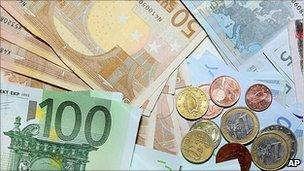Spain's borrowing costs increase on debt fears
- Published

Eurozone leaders want to agree a second rescue package for Greece on Thursday
Spain has had to pay higher interest rates to borrow 4.45bn euros ($6.32bn, £3.9bn) on the financial markets.
In a bond auction on Tuesday the yield on loans repayable in 12 months was 3.702%, up from 2.695% paid on a fund-raising in June.
For 18-month bonds, the yield was 3.912%, up from 3.26%.
The rise reflects greater concern about the risks of lending to debt-laden Spain, despite Madrid's insistence that its economy is recovering.
Traders, however, reported that demand for the bonds was strong. The Madrid stock exchange was up 1.6% in morning trading.
The fund-raising comes amid fears that the debt crisis that engulfed Greece could spread to other, larger, economies.
On Thursday an emergency summit of eurozone leaders will try to agree a second bail-out for Greece involving private lenders and bondholders.
Germany's Chancellor, Angela Merkel, has led calls for private investors to agree to defer Athens' debt repayments.
But the European Central Bank (ECB) and ratings agencies have warned about the consequences of any actions that resemble a debt default.
Jean-Claude Trichet, the ECB president, has said that the bank will not accept Greek government bonds as collateral for loans in the event of a "credit event" - such as a default.
However, ECB council member Ewald Nowotny, suggested on Tuesday that the bank may compromise and allow a temporary credit event.
"There are some proposals that deal with a very short-lived selective default situation that will not have major negative consequences," he told CNBC television.
Greece's finance minister, Evangelos Venizelos, said that a new debt deal was "attainable", seen as a signal that talks between eurozone officials and private investors are making progress.
He told the AP news agency late on Monday: "Reaching a solution is attainable because this solution does not only include Greece.
"At issue is the euro and the resilience of the eurozone. That is why protection of Greece is a self defence mechanism for the eurozone. That will help us avoid a domino effect," he said.